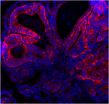(Press-News.org) Cells have two different programs to safeguard them from getting out of control and developing cancer. One of them is senescence (biological aging). It puts cancer cells into a permanent sleep so they no longer divide and grow in an uncontrolled way. Now the research group led by Professor Walter Birchmeier (Max Delbrück Center for Molecular Medicine, MDC, Berlin-Buch) has discovered that an enzyme known to be active in breast cancer and leukemia blocks this protection program and boosts tumor growth. They succeeded in blocking this enzyme in mice with breast cancer, thus reactivating senescence and stopping tumor growth (EMBO-Journal, DOI 10.15252/embj.201489004)*.
The enzyme Shp2 belongs to a group of enzymes called tyrosine phosphatases. These enzymes are major cell growth regulators. Shp2, for example, plays an essential role in early embryogenesis and is also known to play a role in cancer. Some years ago researchers showed that Shp2 is upregulated in 70 percent of invasive breast cancers. These forms of breast cancer are particularly aggressive. Recent studies with human breast cancer cell lines have also shown that Shp2 mediates survival signals in cancer cells.
Reason enough for MDC cancer researcher Professor Birchmeier, who for years has been studying signaling in cancer, to further investigate this enzyme with his research team colleagues Dr. Linxiang Lan and Dr. Jane Holland. Also, current evidence shows that senescence may play an inhibitory role in breast cancer.
The MDC researchers therefore studied mice which carried the breast cancer gene PyMT. This oncogene rapidly initiates breast cancer, which also metastasizes. The researchers noted that the enzyme Shp2 is very active in these mice. They were able to show that Shp2 initiates a signaling cascade. Within this cascade Shp2 turns on different signaling molecules, but turns off the tumor suppressor genes p27 und p53. As a result, the senescence protection program is also shut off.
The question of interest was whether or not senescence can be turned on again. Is it possible to target Shp2 directly and shut it off? Using a small molecule, researchers of the biotech company Experimental Pharmacology and Oncology (EPO), based on the Berlin-Buch campus as is the MDC, were able to shut down the Shp2 gene in the mice with breast cancer. In this way they were able to reactivate the senescence program and stop the growth of the breast cancer cells. The small molecule was developed by the Leibniz-Institut für molekulare Pharmakologie (FMP) in Berlin-Buch. However, it is still an experimental drug and has not been licensed for use in human patients.
The next step was to find out which role Shp2 and its target genes play in human patients with breast cancer. Dr. Balázs Györffy of Semmelweiss University in Budapest, Hungary, a longtime collaborator of Professor Birchmeier, looked at the retrospective data of almost 4,000 patients. After analyzing the data, he and his collaborators in Berlin are convinced that the activity of Shp2 and its target genes can predict the outcome of breast cancer: The less active Shp2 is, the higher the chance for the affected women to stay relapse-free after having undergone a successful breast cancer therapy.
"Our data suggest that senescence induction by inhibiting Shp2 or controlling its targets may be useful in therapeutic approaches to breast cancer," the researchers conclude. Cancer cells in the senescence mode secrete messenger molecules of the immune system (cytokines), enabling the body's defense system to identify these sleeping cancer cells and destroy them.
INFORMATION:
*Shp2 Signaling is Essential to the Suppression of Senescence in PyMT-induced Mammary Gland Cancer in Mice
Linxiang Lan1, Jane D. Holland1, Jingjing Qi1, Stefanie Grosskopf1, Regina Vogel1, Balázs Györffy2,3, Annika Wulf-Goldenberg4, Walter Birchmeier1,*
1 Cancer Research Program, Max Delbrück Center for Molecular Medicine (MDC) Berlin, Germany
2 MTA TTK Lendület Cancer Biomarker Research Group, Budapest, Hungary
3 2nd Department of Pediatrics, Semmelweis University, Budapest, Hungary
4 Experimental Pharmacology & Oncology (EPO), Berlin, Germany
A graph can be downloaded from the internet at:
https://www.mdc-berlin.de/44046890/en/news/2015
Contact:
Barbara Bachtler
Press Department
Max Delbrück Center for Molecular Medicine (MDC) Berlin-Buch
in the Helmholtz Association
Robert-Rössle-Straße 10
13125 Berlin, Germany
Phone: +49 (0) 30 94 06 - 38 96
Fax: +49 (0) 30 94 06 - 38 33
e-mail: presse@mdc-berlin.de
http://www.mdc-berlin.de/en
This news release is available in Spanish.
The researchers explain that online health information searches are the third most popular activity in Google, with 170,000 searches performed every 5 seconds. Isabel Segura Bedmar of the UC3M Computer Science and Engineering Department points out that, "There is a lot of user-generated information these days, so social networks can be a valuable source of information on adverse effects of pharmaceutical drugs after the clinical trial stage is over and the drug is on the market." The large amount and variety of information ...
In the eyes of physicists, magnetic molecules can be considered as nanoscale magnets. Remotely controlling the direction in which they rotate, like spinning tops, may intuitively be difficult to achieve. However, Russian physicists have just demonstrated that it is theoretically possible to do so. They have shown that a change of direction in the circular polarisation of an external magnetic field leads to a change in the direction of the mechanical rotation of the molecule. These findings by Iosif Davidovich Tokman and Vera Il'inichna Pozdnyakova from the Institute for ...
(Boston)--Family support during deployment is an important protective factor against post-deployment suicidal ideation according to a new study in the journal Anxiety, Stress and Coping.
Suicidal ideation includes thoughts that can range from fleeting consideration of suicide to the development of a specific plan for killing oneself. Research on suicidal ideation in veterans who served in support of Operation Enduring Freedom (OEF) in Afghanistan and Operation Iraqi Freedom (OIF) in Iraq has revealed a number of important predictors of suicidal ideation, including potentially ...
Millennials are anything but "newsless," passive, or uninterested in civic issues, according to a new comprehensive study of the information habits of people age 18-34. The research looks closely at how members of the Millennial generation learn about the world on different devices and platforms.
The study finds that Millennials consume news and information in strikingly different ways than did previous generations. Contrary to popular perception, they keep up with news that is commonly referred to as "traditional" or "hard," as well as stories that connect them to hobbies, ...
Our modern epidemic of obesity has led to an alarming rise in the incidence of diabetes. More than 382 million people on the planet suffer from diabetes, predominantly type-2 diabetes. For these people, blood sugar surges -- glucose spikes after meals -- can be life threatening, leading to cardiovascular complications.
A new Tel Aviv University study published in Diabetologia proposes a new way to suppress deadly glucose surges throughout the day -- eating a high-caloric breakfast and a more modest dinner. According to TAU's Prof. Daniela Jakubowicz and Dr. Julio Wainstein ...
March 16, 2015- Special redesigned labels for intravenous (IV) medication bags may help to prevent serious medication errors in the operating room, reports a study in the March issue of the Journal of Patient Safety. The journal is published by Wolters Kluwer.
Based on trainee behaviors during OR simulations, "The results of this study provide additional evidence to support the use of opaque, white medication labels and the use of inverted text for highlighting key medication information on the label," writes Jamie L. Estock, MA, of the VA Pittsburgh Healthcare System ...
March 16, 2015 - The shooting of an unarmed teenager in Ferguson, MO, has ignited a global discussion about implicit racial bias. One group of people you might think would be immune from this hidden bias is clinical therapists, people trained to understand the human mind. But a new field study finds that the social identities of patients and their therapists affect the accuracy of the diagnosis: Therapists were twice as likely to misdiagnose mental illness when their patients were members of a disadvantaged, compared to an advantaged, group.
In her own practice, Ora Nakash, ...
There is still no evidence of genetic difference between blacks and whites to account for the health disparities in cardiovascular disease (CVD), according to a new study by McGill University researchers. Published in the American Journal of Epidemiology, the researchers suggest that after a decade of genetic studies, factors such as lifestyle, education and socio-economics - not genetics - are more promising avenues to understanding racial health disparities.
The researchers focused on cardiovascular disease, the largest contributor to the racial mortality gap, and ...
Colon cancer is a heavily studied disease -- and for good reason. It is one of the leading causes of cancer-related deaths worldwide, and its numbers are on the rise, from 500,00 deaths in 1990 to 700,000 in 2010.
This growth comes despite scientists' ever-increasing knowledge of the genetic mutations that initiate and drive this disease. Now, a team of researchers from the University of Pennsylvania has found evidence of a new culprit in the disease, a protein called MSI2.
Their findings provide a new target for potential therapeutic intervention in colorectal cancer ...
A research group in the UA Lunar and Planetary Laboratory has found evidence in meteorites that hint at the discovery of a previously unknown region within the swirling disk of dust and gas known as the protoplanetary disk - which gave rise to the planets in our solar system.
Led by Kelly Miller, a doctoral student in the lab of Dante Lauretta, the principal investigator of NASA's OSIRIS-REx mission, the team has found evidence of minerals within meteorites that formed in an environment that was enhanced in oxygen and sulfur and date from a time before the particles stuck ...


